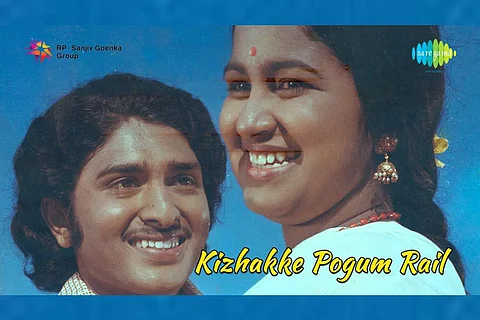

A train meanders through a beautiful landscape, cutting across rivers, veering around mountains, and chugs along from one station to another, as trees and name boards of obscure villages and towns blend into a streak of green and yellow. The train is a metaphor for movement, often quoted to describe life’s journey. But the train is also very real! It runs from one town to another carrying thousands with their dreams and hopes. In one such train, the eastward bound train to be precise, alights a young woman and there begins our story.
Kizhakke Pogum Rail, director Bharathiraja’s second feature, released in August 1978. A buoyant looking Radikaa (what a film to debut in!) steps down from the train with a small sack of clothes and a parrot in a cage. She plays Panjali, who is making her way toward Thamaraikulam village, to move in with her older sister (Gandhimathi) after the demise of their mother.
The choice of naming the character Panjali fits well with the story. Keep in mind that Panjali (Panchali) is another name for Draupadi, the heroine from the epic Mahabharata, and, more importantly, has led to the practice of the Draupathi Amman cult in parts of Tamil Nadu where the goddess is worshipped by many.
The two-hour film, which was a major blockbuster at the time of its release, has more to offer than meets the eye and makes for an interesting watch, even 42 years after it was made.
In this film, the village forms the heart of the story. The entry of a new element from the outside brings in a monumental change to this heart, and this has been discussed as a recurring trope in Bharathiraja’s films – take for instance the doctor from his first film 16 Vayadhinile.
It is into this village that Panjali walks in and becomes the pivot of the story. It is her character that is most alluring in all of Kizhakke Pogum Rail and as the story progresses, you will begin to see why. She walks in as a vivacious, on-the-cusp-of-womanhood young girl, and the director takes his time to let you get to know Panjali. Take the very first scene where she asks a worker in the field (you might be surprised to know this role was played by a young Bhagyaraj) for directions to the village. With her lively sing-song voice that slightly drags, and is amusingly not off-putting at all, Panjali immediately catches your fancy. She’s naive but wise, looks vulnerable but is smart.
Then there’s the friendship that blossoms between two young women. How easy, how natural. As a young woman walking into a new environment, Panjali looks for faces she can connect with, people she could trust. And here the camera zooms into their faces, cuts from Panjali to Kanniamma and then back to Panjali, and they smile at each other. That is all.
Thamaraikulam (meaning lotus pond), as beautiful as the name sounds, is an archetypal village that holds on to superstitious beliefs. There’s also caste discrimination and the director places them for all to see in the film’s early scenes. Paranjothi (Telugu star Sudhakar’s Tamil debut) is from a marginalised caste family and his father works as a barber in the village. Paranjothi is unemployed not because he’s unfit but because he’s an educated man, an aspiring poet.
While the story focuses on the young lovers, Kizhakke Pogum Rail also shines the spotlight on a range of issues. From caste discrimination to Ambedkar’s idea of empowerment through education and openly discussing sexual abuse where the predator is a family member to the mindless superstitions prevalent in villages, the film chugs through a myriad of issues.
And the film deals with all of it with clear thinking, giving us many memorable lines. From Paaranjothi’s unspoken rebuttal to his father to Panjali’s fiery response to her predatory brother-in-law (Goundamani): “If the child had to follow his father, we may not have known Dr Ambedkar. Even Bharathi would be in a temple ringing bells!”, the film is well thought out.
Superstitions play a major role in this film. The bad judgments made by the men who head the panchayat and the villagers’ adherence to senseless rituals, to the extent of harassing a woman for the sake of the “greater good”, are the main villains in the film. The presence of the ex-army man comes as a relief. He intervenes, in crucial moments, like the watchdog a society needs.
Around the time this film was made, the topic of sexuality and sexual abuse were not openly discussed. In Kizhakke Pogum Rail, there is a track that addresses this very issue. From being a child who is unaware of her brother-in-law’s lewd remarks and his inappropriate behaviour, Panjali evolves into becoming more aware of her body and is able to exercise agency over it. The attention to detail in those scenes is incredible.
The train might be a recurring theme in the film, but as Paranjothi and Panjali get on it in the very end, we realise that it is only a means, important nonetheless, by which we travel towards our destination.